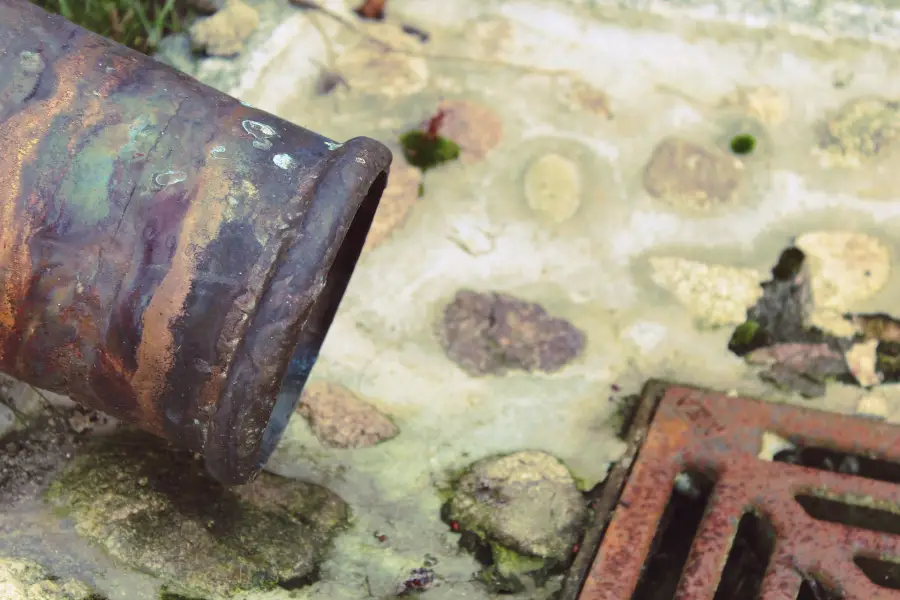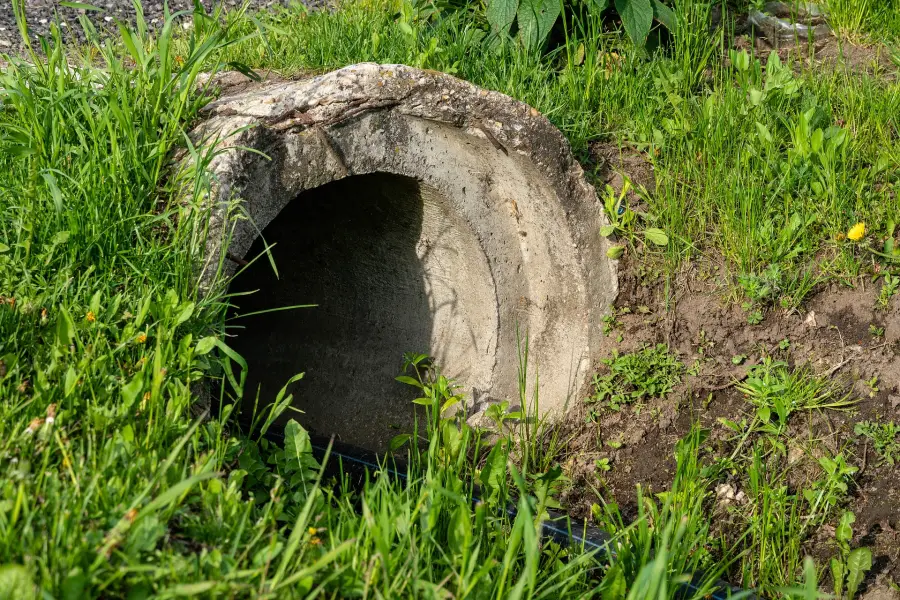Neighbor relations are always a little touchy. For the sake of peace in your community, maintaining cordial relationships between fellow homeowners is essential. However, occasionally, some encroachment issues can rise up and potentially cause problems.
A neighbor’s gutter draining onto your property can in many instances be perfectly legal. If the terrain naturally slopes toward your lawn or drainage flows in that direction, it can mean that you must then deal with the water. On the other hand, unnatural or malicious drainage is not legal.
A major issue in some areas between neighbors is drainage, and in today’s article, we focus on situations where water from your neighbor’s gutters winds up on your property. We will begin by exploring the basic legalese governing this topic before we explore the possible remedies. Let’s get right to it.

Contents
Who Is Responsible For Rainwater Drains On My Property?
This is certainly a tricky question and the answer may vary depending on the specific situation, as well as the governing state, county, or city laws. So, who is responsible for rainwater drains on my property?
If your city has an easement on your land, the maintenance of rainwater drains are their responsibility. If your subdivision installed them at the time of construction, they could be yours. Natural water flow coming from neighbors or adjacent properties are normally your responsibility as well.
Naturally, water from storm gutter drains on buildings on your property is your responsibility. Only you will be responsible for any damages this water causes to your house or yard elements.
The waters (pun intended) are a bit murkier when it comes to water from your neighbors’ property draining onto yours or vice versa. The context must always be the first consideration, even before legal recourse is sought. After all, neighborly relations must be at the forefront. You never want to burn bridges with people in your neighborhood.
That said, drainage from your neighbor’s property can be annoying at best, and a potential cost at worst. In some cases, this drainage can even lead to hazards and serious property damage. Each year in the U.S., there are several cases of water runoff from one property leading to problems on another.
The Natural Flow Rule
The first thing to consider is the terrain itself. If your property is naturally lower than your neighbor’s, it may be difficult for you to seek recourse. A lot of states implement the “natural flow rule”, which simply dictates that in most circumstances, property owners on the lower ground simply have to accept the drainage or take corrective measures on their properties.
Therefore, if you are in this situation, your neighbor will not be liable because they have no control over gravity and the natural flow of water. The natural flow rule is a civil law concept that is derived from Europe. States like Florida and New York use variations of the natural flow rule.
Property owners may contest this rule if the flow of water is a result of direct man-made sloping or gradient change. Neighbors who undertake such measures would be violating the “natural” requirement.
The Common Enemy Rule
Another legal principle that may thwart your attempts at recourse is the “common enemy rule”. Unlike the natural flow rule, which focuses on the gradient of the terrain, the common enemy rule dictates that surface water that results from rainfall affects all landowners.
As such, every landowner is well within their rights to divert the drainage as they see fit. However, any diversions must ultimately bring the water to where it would have flowed naturally.
The common enemy rule is applicable in nearly half of all U.S. states including Washington, California, and Iowa. This doctrine may be challenged by homeowners who feel that diverting surface water onto their yards is not in accordance with the “where it would have naturally flowed” stipulation.
The Reasonable Use Doctrine
In cases where both the natural flow and common enemy rules are (seemingly) inapplicable, landowners will be in the territory of the “reasonable use” doctrine. This is primarily concerned with establishing whether the flow of water is a result of negligence or malice.
As the name suggests, landowners must make reasonable water diversions such as those established in the common enemy doctrine.
However, if the infringed landowner believes that water is being channeled towards their property maliciously or as a result of negligence (broken piping, clogged gutters, etc.), there may be grounds for recourse.
What would help with your case under this doctrine is if you can prove direct damage to your property. Presiding courts also conduct what is known as a balancing test, which involves the following considerations:
- Whether the neighbor’s diversion of the surface water is reasonable, necessary, and consistent with the specific purpose of the land.
- Whether the alteration is carried out reasonably.
- Whether the benefit and usefulness of the neighbor’s diversion outweigh the impact on surrounding properties.
To see other articles from LawncareGrandpa.com you will enjoy…
- Sunken Fire Pit Drainage: Why And How Of Fire Pit Drainage
- Pros And Cons Of A Rock Downspout Catch Basin Under Gutters
- How Far Should A Metal Roof Overhang Gutters?
Can A Neighbor Drain Water Onto Your Property?

What does all of this mean? Can my neighbor legally drain water onto my yard without my consent?
Your neighbor can legally drain water onto your property as long as the drainage is consistent with the requirements of the natural flow rule or common enemy doctrine. Unless it is done against the natural flow of water on the land due to elevation, it is most likely legal for them to do so.
It is up to you to encourage the water to continue on its desired path.
If you live in a state that uses the former, your neighbor can let water drain onto your property as long as the flow follows the natural gradient of the terrain.
If you live in a common enemy state, your neighbor can do the same if the diversions direct surface water to where it would flow naturally. You will only have recourse if you can prove that your yard is not a “natural destination” for the particular neighbor’s drainage.
Application of the reasonable use rule presents the best chance of determining liability. A court will use the balancing test mentioned above to determine whether your neighbor is justified in letting water drain onto your property.
The main thing to keep in mind here is that it is not your neighbors responsibility to hold the water that naturally ends up on his property if it tends to flow toward yours due to elevation and fall. This can be compounded by the structures we tend to put on our land.
Houses and other buildings don’t generate the water in a rainstorm, but they do collect and divert large amounts of it. This can be one of the issues facing many neighbors. Without proper planning, all of the water from the many roofs and surfaces in a normal neighborhood can add up to a staggering amount.
Gutter downspouts normally placed around a structure are going to expel water and it may be directed at your property. Many times it will be up to you to deal with the water entering your property due to rain, drainage, or even your neighbor’s downspout.
There are many types of drainage basins, french drains, and underground piping that can take nearly all of the surface and underground water away from your house and desired lawn areas.
How Do I Stop My Neighbor’s Water From Draining Onto My Yard?
Now that we’ve seen how to determine liability in these situations, it’s time to look at corrective measures.
To stop a neighbor’s water from draining onto your property, you might have to consult your local Homeowners Association for mediation. If that fails, you may have to resort to the courts. Keep in mind that if the flow is deemed natural or appropriate, you may have to deal with the water yourself.
As we mentioned in the introduction, maintaining cordial relations should always be your top priority, regardless of the level of grievance. As such, we always recommend that you approach your neighbor and discuss the issue before escalating up legal channels.
Most neighbors will be collaborative and you could come up with a solution together. Another solution other than basins and french drains are sump pumps. They are a common stop-gap that both of you can opt for.
If you happen to lose with an HOA, in court, or wish to avoid litigation altogether, there are several ways to protect your yard from drainage and any related damage. These measures include:
- Installing a catch basin
- Erecting a raised barrier or berm to redirect the water
- Digging dry wells in the surface water’s path
These are all additional ways you can deal with the water without having to deal with your neighbors.
Another protective measure for your property is flood insurance. However, some brokers may be a bit reluctant to offer coverage for this specific issue.
The Final Touches On A Neighbor’s Downspout Drainage…
There are several ways in which you can address excess water coming from your neighbor’s downspouts onto your property. Here is a quick recap…
- Ignore the issue. Neighborly relations are more important than a little water if no real damage is caused.
- Speak to your neighbor and come up with a common solution.
- Go to your Homeowner’s Association (HOA) and see if they have any applicable regulations they could help you enforce.
- Contact your city or county to find out how they deal with water issues between neighbors.
- Seek help from the legal system as a last resort.
- Take care of the water yourself with a…
- French drain
- Catch Basin
- Dry Well
- Sump Pump
It is best to start with the least confrontational method and work from there. I know from personal experience that having a neighbor that is emotional or vindictive can cause some serious headaches that seemingly last for years.
Hopefully you will have a helpful neighbor that feels the same way. If not, use some of the tips and actions here to alleviate the potential water damage to your lawn or even your home’s foundation.
Here are some other great articles you will like…
- How to Deal With a Downspout Corner (Revealed)
- Pine Tree Roots: How Far They Spread and How To Remove Them
- Raised Garden Beds Next To House Foundations- Explained
References
http://www.duhaime.org/LegalDictionary/C/CommonEnemyDoctrine.aspx
https://smartyardguide.com/neighbors-gutter-drains-on-my-property/
